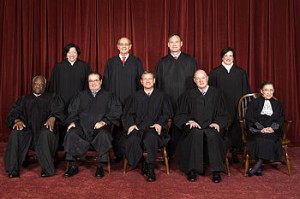 WASHINGTON — The U.S. Supreme Court has agreed to take up a case that would determine whether or not the U.S.Constitution provides states the right to ban same-sex “marriage”—a decision that could have massive ramifications nationwide.
WASHINGTON — The U.S. Supreme Court has agreed to take up a case that would determine whether or not the U.S.Constitution provides states the right to ban same-sex “marriage”—a decision that could have massive ramifications nationwide.
The high court made the announcement on Friday that it would hear cases out of Kentucky, Michigan, Ohio and Tennessee—all within the Sixth Circuit Court of Appeals.
As previously reported, last November, the Sixth Circuit Court of Appeals upheld state bans on same-sex “marriage” in the four states, reversing a year-long trend in the federal courts to strike down such state restrictions as being unconstitutional.
“A dose of humility makes us hesitant to condemn as unconstitutionally irrational a view of marriage shared not long ago by every society in the world, shared by most, if not all, of our ancestors, and shared still today by a significant number of the States,” wrote Judge Jeffrey Sutton, appointed to the bench by George W. Bush, on behalf of the majority.
The court also rebuffed claims that homosexual relationships were entitled to be recognized as marriages simply because they have feelings for each other.
“Their definition does too much because it fails to account for the reality that no state in the country requires couples, whether gay or straight, to be in love,” Sutton explained. “Their definition does too little because it fails to account for plural marriages, where there is no reason to think that three or four adults, whether gay, bisexual, or straight, lack the capacity to share love, affection, and commitment, or for that matter lack the capacity to be capable (and more plentiful) parents to boot.”
But the case was appealed to the U.S. Supreme Court, who agreed on Friday to hear the matter. The case is set to for oral argument in April with a decision in June.
The Christian legal organization Alliance Defending Freedom (ADF) said following the announcement that the court should uphold states’ rights as it suggested in its DOMA decision.
“The people of every state should remain free to affirm marriage as the union of a man and a woman in their laws,” stated Senior Counsel Austin Nimocks. “Consistent with the Supreme Court’s 2013 Windsor decision, which said that ‘states have the essential authority to define the marital relation,’ the 6th Circuit rightly concluded that the Constitution does not demand that a new view of marriage be judicially imposed on everyone.”
“We are hopeful the Supreme Court will uphold the freedom of the people to affirm marriage,” he said.
As previously reported, officials in Utah, Virginia and Oklahoma submitted an appeal to the court last year in an effort to overturn rulings that forced them to either recognize or legalize same-sex “marriages” in their state, but in October, the court announced that it declined to hear the cases. The justices also recently declined to hear an appeal out of Louisiana.
Many states and colonies passed laws criminalizing homosexual behavior even before the founding of America. William Penn, the founder of the Commonwealth of Pennsylvania, wrote in The Great Law in 1682, “And be it further enacted by the authority aforesaid that if any person shall be legally convicted of the unnatural sin of sodomy or joining with beasts such persons shall be whipped and forfeit one third part of his or her estate and work six months in the house of correction at hard labour, and for the second offense imprisonment as aforesaid during life.”
Become a Christian News Network Supporter...


